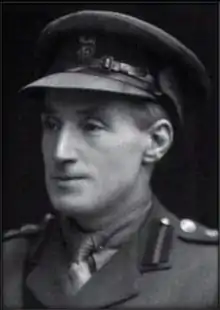Robert Gee
Captain Robert Gee VC MC (7 May 1876 – 2 August 1960) was an English-Jewish[1][2] recipient of the Victoria Cross, the highest and most prestigious award for gallantry in the face of the enemy that can be awarded to British and Commonwealth forces.
Robert Gee VC MC MP | |
|---|---|
 | |
| Born | 7 May 1876 Leicester, Leicestershire |
| Died | 2 August 1960 (aged 84) Perth, Western Australia |
| Allegiance | |
| Service/ | |
| Years of service | 1893–1918 |
| Rank | Captain |
| Unit | The Royal Fusiliers Queen's Own Royal West Kent Regiment |
| Battles/wars | World War I |
| Awards | Military Cross |
| Other work | Member of Parliament |
Biography
Born in Leicester,[3] he was 41 years old, and a temporary captain in the 2nd Battalion, The Royal Fusiliers,[4] British Army during the First World War when he was awarded the Victoria Cross for his actions on 30 November 1917 at Masnières and Les Rues Vertes, France:
An attack by the enemy captured brigade headquarters and ammunition dump. Captain Gee, finding himself a prisoner, managed to escape and organised a party of the brigade staff with which he attacked the enemy, closely followed by two companies of infantry. He cleared the locality and established a defensive flank, then finding an enemy machine-gun still in action, with a revolver in each hand he went forward and captured the gun, killing eight of the crew. He was wounded, but would not have his wound dressed until the defence was organised.[5]
He later transferred to the Royal West Kent Regiment.
Post war
After the war, Gee went into politics. He first stood for Parliament as a National Democratic Party candidate in the 1918 General Election at Consett, where he finished second. He then stood for Parliament as a Conservative in the 1921 Woolwich East by-election against Ramsay MacDonald. A great deal of attention was given in the campaign to the contrast between Gee as a Victoria Cross holder and Macdonald as a pacifist who opposed the war. Gee won the seat which he held until the next general election the following year, when he lost to the Labour Party candidate.
He was elected MP for Bosworth at the 1924 general election.[6] He became clearly disillusioned with Parliamentary life however because he was reported to have been absent from his political duties for over a year at the time of the by-election called in 1927 after his resignation, having emigrated to the backwoods of Western Australia with no intention of returning.[7]
He died in Perth, Western Australia, aged 84. He was cremated at the Karrakatta Crematorium. His Victoria Cross is displayed at the Royal Fusiliers Museum in the Tower of London, England.
References
- William D. Rubinstein, Michael Jolles, Hilary L. Rubinstein, The Palgrave Dictionary of Anglo-Jewish History, Palgrave Macmillan (2011), p. 315
- Encyclopaedia Judaica, volume 11, 1971, p. 1554
- "Our VC's - WW1 - Jewish soldiers". Retrieved 14 March 2013.
- "THE ROYAL FUSILIERS RECIPIENTS OF THE VICTORIA CROSS" (PDF). Retrieved 14 March 2013.
- "No. 30471". The London Gazette (Supplement). 8 January 1918. p. 722.
- F W S Craig, British Parliamentary Election Results 1918-1949; Political Reference Publications, Glasgow, 1969 pp 62 & 410
- The Times, 24 March 1927 p9
- "Elegant Extracts" - The Royal Fusiliers Recipients of the VC (J.P. Kelleher, 2001)
- Monuments to Courage (David Harvey, 1999)
- The Register of the Victoria Cross (This England, 1997)
External links
- Royal Fusiliers Recipients of the Victoria Cross
- Hansard 1803–2005: contributions in Parliament by Robert Gee
| Parliament of the United Kingdom | ||
|---|---|---|
| Preceded by Will Crooks |
Member of Parliament for Woolwich East 1921–1922 |
Succeeded by Harry Snell |
| Preceded by George Ward |
Member of Parliament for Bosworth 1924–1927 |
Succeeded by William Edge |